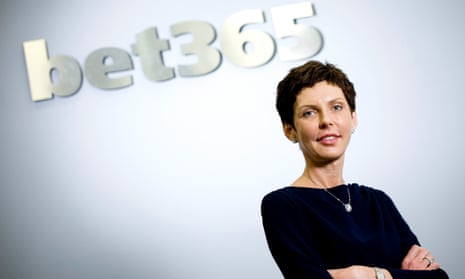The other interesting line in Bet365’s accounts – aside from news of Denise Coates’s £220m salary and £45m dividend – was this: “A geographical analysis of turnover has not been given as in the opinion of the directors such disclosure would be severely prejudicial to the interests of the group.”
Severely prejudicial? Why? Almost every stock market-quoted gambling firm gives a breakdown of turnover and does so for a reason. In an industry where regulation is one of the big risks, shareholders want to know what proportion of online wagers come from fully regulated markets, how much flows from “grey” markets that are in the process of regulating, and whether any cash arrives from unregulated territories.
As a private company, Bet365 is under no similar pressure to disclose. But, as a business that parades its responsible credentials, you’d think it might choose to shed daylight on the makeup of its operations, if only to counter any suggestion that Chinese punters are big users of Bet365. In China betting is illegal except in tightly-controlled environments and people risk prison sentences by placing online bets.
When the Guardian investigated in 2014, Bet365 said: “In the view of bet365, and its lawyers, Chinese law does not extend to the provision of services into China by gambling operators and service providers who themselves have no nexus with the territory. Any allegation of illegality on the part of Bet365 is therefore untrue.”
Fair enough, but does that mean you accept bets from China, or not? The company made no response when emailed the question again on Wednesday.
One could call Coates’s personal reward of £265m last year obscene, especially at a moment of heightened concern about gambling addiction among UK teenagers. Alternatively, one could view it as merely a function of her 50% ownership of a company that made operating profits of £660m last year.
But, as a billionaire in a high-profile industry in the political gaze, Coates could do everybody a favour by being clearer about where Bet365 makes its money. The UK end is clearly tightly regulated and very successful. Tell us about the other parts.
Apocalypse? Nah
In its latest counter to the bears and anonymous online “research” critics, Babcock International did better than last time. The bad bits in the half-year numbers were variously predicted or easy to explain. A £120m exceptional charge mostly related to a writedown of the value of helicopters used to transport North Sea oil and gas workers; a looming £250m “step down” in revenues from decommissioning Magnox nuclear reactors is the result of restructuring of the contract.
In the core defence-related business, which is the focus of all the attention, the numbers looked reasonably solid. Meanwhile, group free cash flow improved and net debt was 12% lower than a year ago at £1.13bn. Ah, the sceptics might say, figures to September tell us nothing about current relations with the Ministry of Defence. Is the MoD worried about cost overruns on the overhaul of HMS Vanguard, the UK’s flagship nuclear submarine? Has Babcock upset its biggest customer? Is it under extra scrutiny?
The firm’s chief executive, Archie Bethel, is not allowed to utter a word about the progress on refitting nuclear subs for (understandable) security reasons. But Babcock was able to report £650m of new orders from the MoD in the past six months and the signing of one of those new-style “joint ways of working” charters with the government. That ought to be reassuring.
In practice, Babcock will probably have to complete a few more laps of the track before investors’ confidence returns. It would also help if its chairman, Mike Turner, after 10 years in post and a share price that has been falling since the purchase of the helicopter firm Avincis in 2014, would say when he will let somebody else have a go.
But is there a true crisis at Babcock, a crucial UK defence contractor? Probably not.
Loose screws
Once upon a time, Kingfisher, the owner of B&Q, was going to take DIY to the world. But China was abandoned a few years ago. Now comes the retreat from Russia, Spain and Portugal.
The strategy makes sense since the UK and France, plus smaller operations in Poland and Romania, are the only parts of the group that matter – and Kingfisher is making heavy weather of integration as it is.
The standout worry is Castorama in France, where like-for-like sales fell by a hefty 7.3% in the latest quarter. Kingfisher is already fretting about “the ongoing impact of national demonstrations”, meaning the gilets jaunes (yellow vests) protest movement. That counts as getting your excuses in early.

